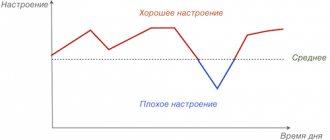Home>Articles>Alcoholic depression: symptoms and treatment
quick menu (hide)
- How does alcohol depression begin?
- Symptoms and varieties
- Mild course
- Depression after binge drinking
- Treatment
- Prevention of alcoholic depression
Alcohol abuse rarely goes away without leaving a trace. Any organs and systems can suffer from a bad habit. And among other things, alcohol leaves its mark on the psyche. Alcoholic depression often accompanies an addicted person. This condition requires special attention . How to get out of alcoholic depression, and how to understand that an alcohol addict is on the verge of this disorder?
Many people consider alcoholic drinks as a kind of antidepressant. After all, they allow you to relax and forget about problems. But don't be fooled. Any specialist will tell you that alcohol is not an antidepressant, it has the opposite effect. And it doesn't solve any problems. On the contrary, it often becomes the cause of severe depression, most often of the bipolar type. In practice there are indeed very often cases when a person seeks salvation from negativity at the bottom of the bottle, and then does not know how to get rid of alcoholic depression.
How does alcohol depression begin?
Considering such a broad topic as alcoholic depression, symptoms and treatment, it is necessary to study the algorithm for the formation of this condition. Thus, human emotions are formed by neurotransmitters. Their task is to transmit nerve impulses. Ethyl alcohol causes a decrease in con-serotonin, and this leads to worsening mood and gradual mental changes, including depression .
Alcohol consumption also leads to excessive production of norepinephrine, which is called the “rage hormone.” Therefore, excessive activity and energy surge arise. But as soon as alcohol intake stops, levels of this substance in the body drop. This leads to apathy and lethargy, which can also stimulate the onset of depression. Alcohol is processed by the body quickly enough, but toxic compounds remain in the body for a long time, continuing their effect.
Any alcoholic beverage can cause depression, any doctor will tell you this. Alcohol gives a short period of euphoria, and then for a long time provokes the opposite effect. Practice shows that alcoholism goes hand in hand with depression, anxiety, and manic disorders. Moreover, the longer the experience of alcoholism, the greater the likelihood of depression and other related disorders . Statistics show that alcoholic depression occurs more often after the age of 35, among experienced alcoholics. It can take severe forms and be accompanied by suicidal thoughts and actions.
Literature:
- Clinical and psychological characteristics of alcohol dependence combined with endogenous depression: a manual for doctors / T. G. Rybakova, O. F. Eryshev; Ministry of Health and Social Development of the Russian Federation, St. Petersburg Scientific Research. Psychoneurological Institute named after. V. M. Bekhtereva. – St. Petersburg: Publishing House of St. Petersburg Scientific Research. Psychoneurological Institute named after. V. M. Bekhtereva, 2008. – 26 p.
- Krylov, Evgeniy Nikolaevich./ Depressive disorders in the clinic of alcoholism: abstract of thesis. ... Doctor of Medical Sciences: 14.00.18 / Moscow. scientific research Institute of Psychiatry. – Moscow, 2004. – 35 p.
- Depression and alcoholism, clinical and social relationships: educational and methodological manual / Shcherbak E. A., Kutashov V. A., Sivolap Yu. P.; Ministry of Health of the Russian Federation, Voronezh State Medical University named after N. N. Bauman. – Moscow: RITM, 2021. – 173 p.
Alcohol depression, symptoms and types
When it comes to a disorder like alcoholic depression, the symptoms can be very characteristic. So, among the most noticeable and frequent manifestations:
- Socially unacceptable and dangerous behavior;
- Increased injury rate;
- Suicidal thoughts and actions;
- Development of encephalopathy;
- Personality degradation;
- Epileptic psychosis as a consequence.
In practice, post-alcohol depression can occur in two ways. There are cases of short-term course after one-time cases of excessive drinking. There may also be a severe disorder , which usually occurs after heavy drinking. In the first case, everything goes away on its own, and quite quickly. The second case is characterized by long-term disorders with severe manifestations. The person may need medical help.
Why does it occur
The disorder is multifactorial in nature. It can occur for a number of reasons:
- metabolic disorders;
- severe ethanol intoxication;
- mental and somatic disorders;
- painful withdrawal;
- rapid personality degradation;
- inability to drink alcohol at the beginning of drug treatment for alcoholism;
- social problems caused by frequent drinking;
- binge drinking, uncontrollable craving for alcohol;
- damage to brain receptors.
Mild alcoholic depression, symptoms and treatment
After drinking too much, depression occurs along with withdrawal symptoms. There are physiological signs of a hangover , and emotional depression and bad mood are also felt. A person may load himself with guilt due to an episode of drunkenness, experience remorse, and remorse. Nervousness can occur against the background of potassium deficiency and other physiological processes characteristic of the body after alcohol stress.
These short-term disorders are characterized by a persistent genetic dependence . There are people who never encounter such manifestations in their lives. For others, on the contrary, the problem occurs frequently. This is due to alcohol hydrogenase and its production by the body.
Usually in such situations the question of how to cope with alcoholic depression does not arise urgently. It goes away on its own; for some, it goes away within a few hours. Sometimes the problem lasts for several days , but still goes away on its own over time.
Depression after binge drinking
The second case is more serious. There may be a complex disorder that requires complex treatment and the help of specialists. After long binges, this state occurs 2-5 days after the cessation of drinking, and marks the beginning of withdrawal syndrome . This begins to appear at stages 2-3 of alcoholism.
The deterioration of the mental state occurs simultaneously with physiological symptoms. Tremors, convulsions, and other symptoms characteristic of withdrawal occur. Alcoholic depression is growing, the treatment of which will be required. It can be expressed by strong negative experiences , crisis and lack of purpose in life, lack of understanding of one’s own importance. This type of depression forces a person to see the world in dark colors, to feel complete powerlessness and despair. All this answers the question of why alcoholics may commit suicide during abstinence.
Depression of this kind should not be looked upon with disdain. They pose a hidden threat to humans. And it’s not just a matter of suicidal risk, although this cannot be ignored . So, after a binge, a person can look quite well and return to work and normal everyday life. However, inside he will be filled with negativity, will see the world in dark colors and will look for a substitute for alcohol that will bring colors back to life. Of course, the new way of experiencing joy may be even more detrimental. Gambling, drugs, promiscuous sex life, and dangerous behavior can be chosen as a substitute. Some people tend to “go to work” at such moments and get chronic fatigue syndrome. the help of competent specialists can eliminate such consequences .
Content:
- General information about alcohol depression
- Why does it occur
- Time of onset of depression in alcohol addicts
- Symptoms of the disease
- Treatment 5.1. Detox for depression in addicts 5.2. Drug treatment of alcoholic depression 5.3. Psychological correction
- What can alcohol depression lead to?
Depression in alcoholism is a fairly common phenomenon.
Its duration can range from several weeks to several months. A person feels worst during abstinence days. Then the psychological state is aggravated by increasing painful symptoms. With alcoholic depression, the addict feels lonely and unwanted. Everything that happens around him seems meaningless. To avoid sad consequences, it is important to take the drinker to a consultation with a psychologist or psychotherapist. If a person does not receive psychological help, he may think about suicide.
Alcohol depression - symptoms
Post-alcohol depression can vary in duration. Episodes stretch over a period from a day to a year, everything is very individual. The condition is fraught with relapses , often approaching manic-depressive psychosis. Symptoms associated with substance use disorders include:
- Insomnia or drowsiness.
- Cognitive problems.
- Decreased social activity
- Mood swings.
- General lethargy, which can be replaced by pathological activity.
- Gastrointestinal problems.
- Decreased appetite or gluttony.
- Increased causeless anxiety.
- Feeling of worthlessness.
- Attempts to escape from reality, even to the point of suicide.
- Unreasonable attacks of irritation and anger.
- The choice in favor of isolation from society, a secluded lifestyle.
- Lack of interest in everything.
- Lack of sexual interest and activity.
- Inability to do usual activities and work.
Consequences
The disease negatively affects all aspects of life. Sleep and appetite disorders lead to the development of new and exacerbation of existing chronic diseases. Long-term dysphoria causes breakdowns and further alcoholic episodes, which ultimately accelerates the progression of alcoholism. Aggression towards loved ones and self-aggression is possible. The risk of injury increases. Families are being destroyed. People are losing their jobs. Metal-alcohol psychoses and other mental disorders develop. The most tragic outcome is suicide.
Alcohol depression, treatment
Speaking about the problems of treating these conditions, it is worth noting the most difficult moment. For the most part, people susceptible to alcoholism do not consider their depression to be related to alcoholism. Meanwhile, it is the toxic effects of alcohol that give rise to depression, especially in the case of sudden withdrawal from binge drinking. Therefore, it is worth noting that the treatment of depression of this kind should begin with the treatment of alcoholism as the root cause of their occurrence.
Full awareness of the problem significantly helps in combating it. Understanding that after giving up alcohol, depression will begin along with withdrawal, a person will be ready for it and will be able to overcome it. Also, if necessary, you can seek help from psychologists and psychiatrists at rehabilitation centers and assistance centers. Existing social adaptation programs are excellent at helping to cope with such problems.
Mild forms of post-alcohol disorders usually go away on their own, and the help of doctors is rarely required. If we talk about problems of moderate severity, a little help may be needed here, and in the vast majority of cases it ensures success. However, severe disorder following binge drinking requires professional management, since it is a complex and responsible process. Modern experts point out the advisability of an individual approach, choosing complex treatment. It includes psychotherapy, procedures and medications.
Prevention of alcoholic depression
Quitting alcohol completely gives a person many benefits. This measure allows you to improve your life, succeed in your career, and find family happiness . To eliminate alcoholic depression, you need to eliminate alcohol itself from your life. If you have a persistent addiction, it is better to turn to specialists, because a rehabilitation center or clinic will definitely help you in the best possible way. Those who decide to deal with the problem on their own should be given practical advice.
So, whenever possible, you should avoid the company of people who drink and events where there will be drinking. If this is not possible and you have to attend a party or communicate with people who drink, you need to come up with a compelling “legend” about why you should not drink. For example, you can say that you are taking medications that do not combine with alcohol. Perhaps considering heredity will help motivate yourself to give up alcohol. If among your relatives there were alcoholics or people with mental disorders, you should absolutely not associate your life with alcohol.
With a general tendency towards depression, it is worth communicating with positive people, and not yet succumb to apathy in the spring and autumn.
Bright lighting, vitamins and pleasant little things will drive away the blues. You should also definitely acquire an interesting hobby that will not let you get bored and idle. Then a bad mood will definitely not threaten you.
Clinical manifestations of the disorder
The disease can be recognized by the following symptoms:
- constant feeling of internal tension and anxiety, anxiety;
- pessimism, lack of confidence in one’s abilities, in one’s ability to give up alcohol, complete treatment, or undergo rehabilitation;
- melancholy, apathy, loss of interest in what is happening around;
- feeling weak, tired, unwilling to do anything.
In addition, post-alcohol depression is characterized by:
- sleep disorders;
- asthenic syndrome;
- fatigue, exercise intolerance;
- absent-mindedness, lack of concentration, problems with concentration, memory;
- feeling of tightness, emptiness in the chest;
- shortness of breath, rapid heartbeat;
- frequent headaches.
When talking, pay attention to the patient’s manner of communication. Speech is quiet, without emotional overtones, regardless of the topic of conversation. It is impossible to cheer a person up: he does not react to jokes and does not even try to joke himself. It is very difficult to get him to talk - he answers questions posed forcefully, in monosyllables.
The patient does not even want to move again . A person suffering from post-alcohol depression is characterized by inactivity. He sits motionless for hours with his shoulders bent and his head down, or lies on the bed with his knees pressed to his stomach. When talking or performing any actions, he can “turn off” for a few seconds, staring motionlessly at one point, and then forget about what he was doing.
Types of post-alcohol depression
- Sad (or melancholic). Accompanied by lethargy and constant painful tension. The patient often talks about his guilt, worthlessness, and hopelessness. He analyzes past actions in search of another reason for self-flagellation.
- With a predominance of anxious affect. Often, against the background of this form of post-alcohol depression, phobias, manias, and delusions develop.
- Apathetic. One of the most severe variants of the disease, since suicidal thoughts often appear against the background of indifference and indifference.








